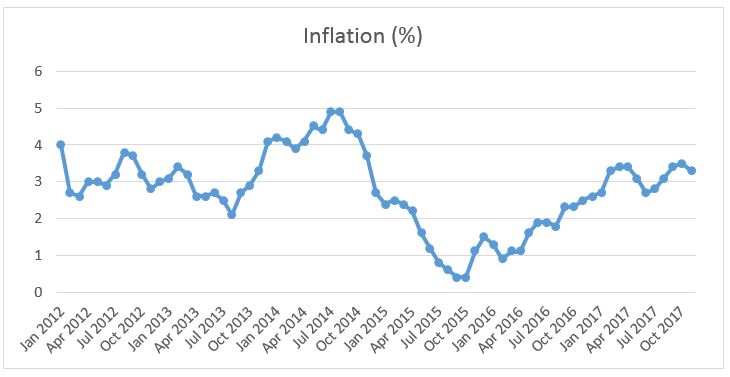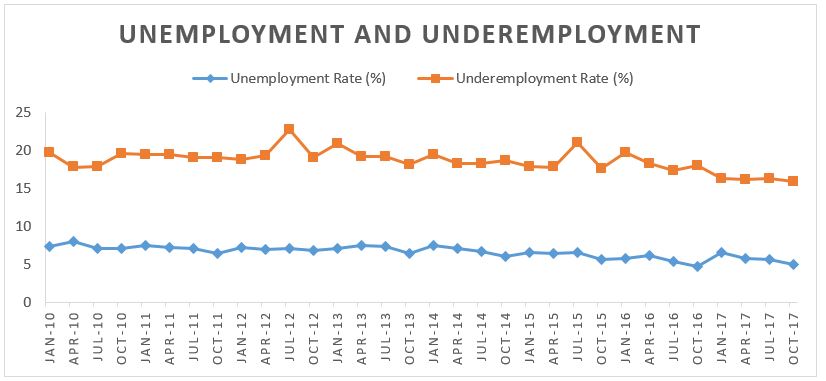2018 economic outlook: How PH can sustain momentum | ABS-CBN
ADVERTISEMENT

Welcome, Kapamilya! We use cookies to improve your browsing experience. Continuing to use this site means you agree to our use of cookies. Tell me more!
2018 economic outlook: How PH can sustain momentum
2018 economic outlook: How PH can sustain momentum
Cathy Yang,
Edson Guido,
Bruce Rodriguez and Warren de Guzman,
ABS-CBN News
Published Jan 03, 2018 08:27 AM PHT
MANILA - The growth momentum of the Philippine economy in 2018 rests on the government's capacity to implement twin initiatives to reform the tax system and rebuild the country's infrastructure, an economic manager said.
MANILA - The growth momentum of the Philippine economy in 2018 rests on the government's capacity to implement twin initiatives to reform the tax system and rebuild the country's infrastructure, an economic manager said.
Gross domestic product can grow by as much as 8 percent this year after average growth of 6.7 percent so far in January to September period last year, Bangko Sentral ng Pilipinas Deputy Governor Diwa Guinigundo said.
Gross domestic product can grow by as much as 8 percent this year after average growth of 6.7 percent so far in January to September period last year, Bangko Sentral ng Pilipinas Deputy Governor Diwa Guinigundo said.
"If we will be able to implement what the government intends to do, I'm sure it is very doable," Guinigundo told ANC.
"If we will be able to implement what the government intends to do, I'm sure it is very doable," Guinigundo told ANC.
Security Bank economist Angelo Taningco forecasts a 6.8-percent expansion for 2018 if the implementation of the P8 trillion infrastructure rebuilding slows down.
Security Bank economist Angelo Taningco forecasts a 6.8-percent expansion for 2018 if the implementation of the P8 trillion infrastructure rebuilding slows down.
ADVERTISEMENT
"I think it's not a bad number when it comes to growth momentum, it's still a pick up compared to this year," he said.
"I think it's not a bad number when it comes to growth momentum, it's still a pick up compared to this year," he said.
A resurgence in exports helped drive growth in 2017, offsetting a slowdown in investments that led the expansion in the previous year, data showed.
A resurgence in exports helped drive growth in 2017, offsetting a slowdown in investments that led the expansion in the previous year, data showed.
Optimism over tax reform will help attract more investors this year, Taningco said.
Optimism over tax reform will help attract more investors this year, Taningco said.
The government has not released fourth quarter and full year GDP figures for 2017.
The government has not released fourth quarter and full year GDP figures for 2017.
President Rodrigo Duterte signed before the end of 2017 the first package of tax reform, which will raise duties on fuel, sugar-sweetened drinks and cars to offset a reduction in personal income tax rates.
President Rodrigo Duterte signed before the end of 2017 the first package of tax reform, which will raise duties on fuel, sugar-sweetened drinks and cars to offset a reduction in personal income tax rates.
Guinigundo said tax reform could spike consumer prices by 0.6 point and full-year inflation for 2018 could "approach higher the target" of 2 to 4 percent. Such inflation pressures will be "transitory," he said.
Guinigundo said tax reform could spike consumer prices by 0.6 point and full-year inflation for 2018 could "approach higher the target" of 2 to 4 percent. Such inflation pressures will be "transitory," he said.
With inflation quickening, the BSP could raise interest rates up to 4 times this year, the first adjustment since September 2014, Nomura senior economist for Southeast Asia Euben Paracuelles said.
With inflation quickening, the BSP could raise interest rates up to 4 times this year, the first adjustment since September 2014, Nomura senior economist for Southeast Asia Euben Paracuelles said.
"This is a way for the BSP to demonstrate its inflation fighting credentials, and obviously, from a credibility standpoint that matters a lot," he said.
"This is a way for the BSP to demonstrate its inflation fighting credentials, and obviously, from a credibility standpoint that matters a lot," he said.
A surge in construction activity would also help further reduce unemployment and underemployment, as infrastructure firms seek laborers, said Guinigundo.
A surge in construction activity would also help further reduce unemployment and underemployment, as infrastructure firms seek laborers, said Guinigundo.
The government, through its vocational school TESDA, can help retool the workforce to meet the needs of the construction sector, he said.
The government, through its vocational school TESDA, can help retool the workforce to meet the needs of the construction sector, he said.
"You can produce people who can do various aspects of constructions like kingsmith, electrical, carpentry. I think these are things that will be needed when we really see a more expanded phase of construction in the Philippines," he said.
"You can produce people who can do various aspects of constructions like kingsmith, electrical, carpentry. I think these are things that will be needed when we really see a more expanded phase of construction in the Philippines," he said.
Retraining the workforce is "doable" given a surplus in labor, Taningco said.
Retraining the workforce is "doable" given a surplus in labor, Taningco said.
"There is still ample labor force willing to work in the construction sector, as long as there are incentives in place," he said.
"There is still ample labor force willing to work in the construction sector, as long as there are incentives in place," he said.
Guinigundo said pressure on the current account due to infrastructure-driven imports should not be a cause for concern, since remittances and revenues from the business process outsourcing industry remained strong.
Guinigundo said pressure on the current account due to infrastructure-driven imports should not be a cause for concern, since remittances and revenues from the business process outsourcing industry remained strong.
The Philippines posted a balance of payments deficit of $1.37 billion dollars in the January to September period of 2017 from a surplus of $1.65 billion during the same period in 2016, BSP data showed.
The Philippines posted a balance of payments deficit of $1.37 billion dollars in the January to September period of 2017 from a surplus of $1.65 billion during the same period in 2016, BSP data showed.
Guinigundo said remittances likely totaled $28 billion at the end of last year while BPOs likely contributed up to $25 billion.
Guinigundo said remittances likely totaled $28 billion at the end of last year while BPOs likely contributed up to $25 billion.
"That's a big fixture in the current account, which will provide the anchor to the current account growing beyond what people may call unreasonably large current account deficit," he said.
"That's a big fixture in the current account, which will provide the anchor to the current account growing beyond what people may call unreasonably large current account deficit," he said.
The peso fell to its lowest levels in 11 years against the dollar in 2017, which some analysts blamed on dollar demand driven by construction.
The peso fell to its lowest levels in 11 years against the dollar in 2017, which some analysts blamed on dollar demand driven by construction.
The local currency recovered some of its losses at the end of the year, which the BSP attributed to strong remittances and equity inflows.
The local currency recovered some of its losses at the end of the year, which the BSP attributed to strong remittances and equity inflows.
"We are growing and I think the economy can take care of itself. There are supporting factors to economic growth," said Guinigundo.
"We are growing and I think the economy can take care of itself. There are supporting factors to economic growth," said Guinigundo.
ADVERTISEMENT
ADVERTISEMENT






